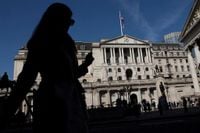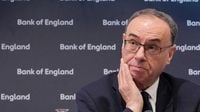The FTSE 100 and European stocks rose on Thursday, May 8, 2025, as investors eagerly awaited the Bank of England's (BoE) decision on interest rates. The BoE is widely expected to cut rates from 4.5% to 4.25% during its latest Monetary Policy Committee (MPC) meeting, marking the fourth reduction in the current cycle. Some analysts speculate that a more aggressive cut of 0.5 percentage points might be considered to alleviate the financial burden on households and businesses.
James Mashiter, a fixed income portfolio manager at SEI, noted, "We think the Bank of England will cut the base rate by 25 basis points, in line with market expectations. However, with a whiff of stagflation in the air, the BoE is in a difficult position as it attempts to stimulate growth while keeping inflation expectations anchored and the bond vigilantes at bay.”
This MPC meeting is particularly significant as it follows the recent economic turmoil triggered by U.S. President Donald Trump's "Liberation Day" tariffs, which have had a global impact. UK inflation has recently fallen toward the BoE's target of 2%, with the consumer prices index (CPI) slowing to 2.6% in March, down from 2.8% in February, indicating that the central bank may have room to lower rates further.
In early morning trading, London’s benchmark index (^FTSE) was up 0.3%, reflecting positive sentiment among traders. Germany's DAX (^GDAXI) increased by 0.6%, and the CAC (^FCHI) in Paris rose 0.4%. The pan-European STOXX 600 (^STOXX) was also up by 0.2%. Meanwhile, the pound slipped slightly by 0.1% against the U.S. dollar, trading at 1.3284.
City of London leaders are keenly awaiting the BoE's monetary policy decision, which is scheduled to be announced at 12:02 PM, following a two-minute silence to commemorate Victory in Europe Day. Investment analysts suggest that the likelihood of a rate cut is nearly 100%, although there is some debate about how quickly the BoE will move to lower borrowing costs throughout the year.
Jeff Brummette, chief investment officer at Oakglen Wealth, remarked, "A base rate cut was ‘nailed on’ but suggested that most investors will be looking for any suggestions that the Bank will project a faster pace of cuts, as seen at the European Central Bank (ECB).”
Market experts have priced in three more cuts by the end of 2025, potentially bringing interest rates down to as low as 3.5%. Morgan Stanley economist Bruna Skaric predicted that rates could fall to 3.25% within the next seven months, as the BoE may abandon its previous cautious language regarding gradual rate cuts.
Professor Andrew Angus from the Cranfield School of Management stated, "All eyes are on the Bank of England’s MPC to see how far they are prepared to go. In the face of gathering economic clouds, businesses and households are desperate for at least a quarter-point cut, but many will be hoping for a bolder half-point reduction.”
As the UK economy grapples with the fallout from Trump's tariffs, which imposed a 10% levy on all UK exports and a 25% charge on steel, aluminum, and cars, the government is facing increased pressure. Chancellor Rachel Reeves has been warned of a potential £60 billion black hole in the government’s finances, raising concerns about possible tax hikes or spending cuts this autumn.
Additionally, the National Institute of Economic and Social Research (NIESR) has forecasted that the UK economy will grow by only 1.2% in 2025, a downgrade from earlier predictions of 1.5%. The think tank indicated that the reduced growth outlook is primarily due to domestic factors rather than Trump's tariffs, which have created significant uncertainty.
In the meantime, the anticipated announcement of a Transatlantic trade pact later today could provide a glimmer of hope for UK businesses, following a recent deal struck with India. Sir Keir Starmer is expected to update the public on the trade talks with the U.S. later today.
As the BoE prepares to announce its decision, many analysts are closely monitoring the impact of Trump's tariffs on UK inflation and economic growth. Sandra Horsfield, an economist for Investec, stated, "What makes this month's decision easy is that virtually everything has pointed in the direction of lower UK inflation pressure.”
In related news, British Gas has reported that its profits will take a hit due to warmer-than-usual spring weather, while Halifax revealed that the average UK house price increased by nearly £900 in April, despite concerns over a potential slowdown in the housing market.
Overall, today's MPC meeting and the subsequent interest rate decision could have significant implications for the UK economy, as businesses and households alike await the outcome. With rising inflation and the challenges posed by global trade dynamics, the BoE's actions will be closely scrutinized in the coming weeks and months.



